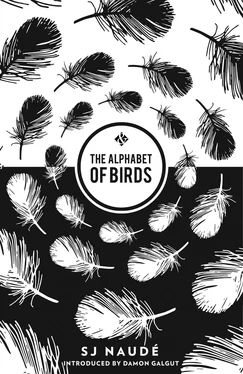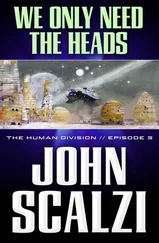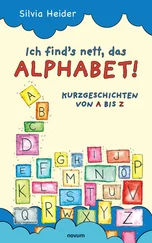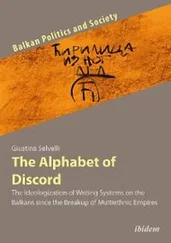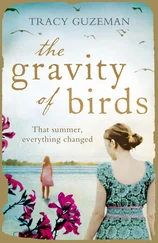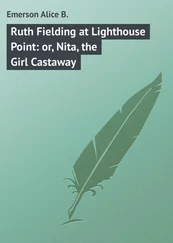‘You’re just in time,’ says Sam’s friend the photographer when they walk past the photographs. ‘Night’s on its way, there’s no electricity here.’
By the time they get to the ‘Gardens of Eden’, dusk has deepened; he can only vaguely make out the images.
‘How does one get people to attend an exhibition here?’ he asks the photographer.
‘Lure them with cheap wine. Stuff to smoke. Friends and vagrants. Half the wine at the opening was filched by local meth addicts and glue sniffers. I took some shots of it. Am still planning to hang it with the rest of the stuff. I think I’ll call it “Bums who OD on art”. Maybe I should add some photos of this bunch as well.’ He gestures towards the little group in the corner. White kids in their twenties, barefoot. Someone has switched on some music, wine is being swigged by candlelight. Everyone is speaking Afrikaans.
It is warm here at the top, as if the heat of the coal fires on lower storeys is rising and gathering under the ceiling. The photographer takes off his shirt. BOER is tattooed on his muscular chest. His joint is shedding tiny flakes of ash. He absent-mindedly touches his nipple and pecs with a fingertip. The flakes smudge — two grey lines, flickering like phosphorus in the pale light, are drawn across his chest.
The group in the corner offer him something to smoke and sniff. Strong stuff, he is told. He declines. He is no longer a youngster with the urge to experiment. He is in any event still enjoying the unnatural clarity of the mushrooms.
‘Show us your Butoh again,’ someone urges Sam.
While Sam takes off his clothes and gets in position on the floor, he takes a cigarette that is offered him. He retreats, opens a window. From the zoo: the sound of monkeys. Not a thing stirring in the street. Someone places a circle of candles around Sam.
The performance is far slower than the one on the stage before. As it progresses, it slows down even further, to virtual non-movement. The air solidifies around Sam. He stretches his mouth open in an ancient grin. In the half-dark his teeth are whiter than ever. Sam holds the grin until it seems as if his mouth might never close again. The grin disturbs him; he has to look away. On either side of him the space disappears in the dark. Some of the ceiling tiles are missing; candlelight gleams against wires hanging from the holes. A screeching from the zoo. Peacocks? One starts, then others join in. It sounds like fear.
He walks to Sam when the performance is over. Sam is standing in the candlelight. He is still naked.
‘Returning isn’t possible,’ he tells Sam.
Sam’s eyes are glazed over. He is still in the process of returning from his body-world, from his pre-emotional state. ‘What are you talking about? Returning to where?’
When he doesn’t say anything, Sam says, ‘Don’t, then. Whatever it is, just leave it. Just leave it behind.’
He returns to the window. Sam keeps watching him, he notices from the corner of his eye. He wants Sam to follow, but he does not, just turns to the BOER, who has something to say about the Butoh. He turns towards the window, opens it wider. The silence of the city settles like an irreversible stiffness in his muscles.
Sam is not with him, he thinks, and he is, similarly, not with any of the people in this fatherless little crowd, none of whom he will ever see again after this evening. He is no more with them than he is with any of the squatters beneath them (beneath them? Perhaps they have already crawled up through the air ducts, perhaps they are waiting at the edges of the light to pounce and tear every last shred of clothing from these kids’ bodies). Loose. They are all loose — loosened from each other. He turns around, observing the scene. He withdraws from the light, inching his way backwards. His hands search the wall behind him for the exit.
Only a single street light is working. Pieces of cardboard move across the pavement. Plastic bags are blowing down the street like flowers. A vagrant is pulling his possessions on a trolley with a broken wheel. It is making an unearthly noise. The waste is piling up in this city, he thinks, the place is filled with relics. Simultaneously recognisable and unrecognisable. One big performance space. Something smells new, fresh. It starts raining. He takes off his shoes. He starts walking. It will take him a long time, but he does not care: he will not stop until he has left the city behind completely, until he can no longer see a single light.
One of the first jacaranda blossoms falls on his face, slides down his cheek. He takes it in his hand, looks at it in the half-light. It contains an entire garden, he thinks, this flower.
The Afrikaans versions of most of these stories were written as part of a master’s degree in creative writing at the University of Stellenbosch.
I’m grateful to Marlene van Niekerk and Willem Anker, my supervisors in the MA. Thanks to the following people who commented on (some of) the stories: Stevan Alcock, Pierre Brugman, Wynand Coetzer, Stephanus Muller, Sansia Naudé, Bibi Slippers, Richard Uschold and James Whyle. Thank you to my father, in whose home a few of these stories were written. Thanks also to Frederik de Jager and Fourie Botha, my original publisher and editor at Umuzi, and to Stefan Tobler, Sophie Lewis and Ana Fletcher at And Other Stories. I am also indebted to Rebecca Carter, my agent at Janklow & Nesbitt in London.
And thank you to Damon Galgut for writing an introduction to the collection.
Some sources that I found useful:
Auster, Paul, 1975. ‘One-Man Language’, The New York Review of Books . Volume 22, number 1.
De Quincey, Thomas, 1886. Confessions of an English Opium Eater . W Scott Publishing Company.
Heller-Roazen, Daniel, 2005. Echolalias: On the Forgetting of Language . Zone Books.
Morrison, Robert, 2010. The English Opium Eater: A Biography of Thomas de Quincey . Pegasus.
Ross, Alex, 2007. The Rest is Noise: Listening to the Twentieth Century. Farrar, Straus & Giroux.
Vollmann, William T, 2010. Kissing the Mask: Beauty, Understatement and Femininity in Japanese Noh Theater, with Some Thoughts on Muses (Especially Helga Testorf), Transgender Women, Kabuki Goddesses, Porn Queens, Poets, Housewives, Makeup Artists, Geishas, Valkyries and Venus Figurines . Ecco Press.
Wolfson, Louis, 1975. Le Schizo et les langues . Gallimard.
Dear readers,
We rely on subscriptions from people like you to tell these other stories — the types of stories most publishers consider too risky to take on.
Our subscribers don’t just make the books physically happen. They also help us approach booksellers, because we can demonstrate that our books already have readers and fans. And they give us the security to publish in line with our values, which are collaborative, imaginative and ‘shamelessly literary’.
All of our subscribers:
receive a first-edition copy of each of the books they subscribe to
are thanked by name at the end of these books
are warmly invited to contribute to our plans and choice of future books Become a subscriber, or give a subscriptionto a friend
Visit andotherstories.org/subscribe to become part of an alternative approach to publishing.
Subscriptions are:
£20 for two books per year
£35 for four books per year
£50 for six books per year Other Ways to Get Involved
If you’d like to know about upcoming events and reading groups (our foreign-language reading groups help us choose books to publish, for example) you can:
join the mailing list at: andotherstories.org/join-us
follow us on Twitter: @andothertweets
Читать дальше
